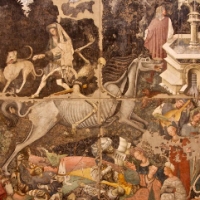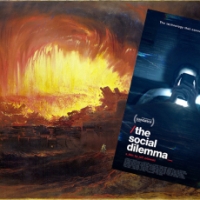Understanding Fascism – making sense of dark times – a reading list (expanded 10/20/17)
“No other method exists for acquiring knowledge about the human heart than the study of history coupled with experience of life, in such a way that the two throw light upon each other. It is our duty to supply this food to the mind of youth, the mind of Man.” – Simone Weil
In order to learn from history, one must learn history. And though this seems obvious, it is a truth that often goes forgotten. Alas, much like history.
The present moment is one in which many people are scrambling to make sense of what is going on in the world, and as such many are turning (admittedly a bit late) to history for guidance. Especially, insofar, as people harbor the fear that we are living through the early stages of history repeating itself. It used to be that one would be denounced for hyperbole by evoking the specter of fascism, but these days that term has many a person quite worried. Thus, many seem to be turning to Hannah Arendt’s classic The Origins of Totalitarianism – and though that book is certainly worth reading, what follows are some different texts to consider. These were the books that I kept thinking about, over the course of the last year; the books that I felt provided me with some sort of insight into what was unfolding. The books in the following list are overwhelmingly written by individuals who had some sort of direct experience with the rise and rule of fascism. Therefore, these are not merely dry accounts of what happened – but fervent efforts on the parts of these authors to make sense of the horrors they lived through. In trying to make sense of their time, these authors can provide us insight into making sense of our own time. It is true that some of these books cover similar themes and topics, though they are not actually redundant, but these are books which work best when placed into conversation with each other. While there is plentiful historical scholarship on fascism, the Nazis’ rise to power, the Holocaust, and World War II – this list emphasizes works by those who personally lived through the period.
Admittedly, these are not fun books to read – but, as I’ve argued before, pessimism is often unnervingly prescient. The authors of most of these books would not be surprised about the current world situation.
After all, they tried to warn us.
Escape from Freedom
By: Erich Fromm
“Any attempt to understand the attraction which Fascism exercises upon great nations compels us to recognize the role of psychological factors. For we are dealing here with a political system which, essentially, does not appeal to rational forces of self-interest, but which arouses and mobilizes diabolical forces in many which we had believed to be nonexistent, or at least to have died out long ago.” (5)
About the book: Why do seemingly normal people become fascists? Certainly, there are those drawn to fascism by xenophobia, love of violence, or “the authoritarian character” – but what about those who did not manifest any signs of such grim proclivities? With Escape from Freedom (which is sometimes published as The Fear of Freedom), Fromm seeks to make sense of the psychological conditions in a society that make people susceptible to the appeals of fascism. Fromm examines the slow emergence of capitalism and the ways in which it brought with it new versions of social, political, and economic freedom that displaced earlier systems of meaning. With the rise of these freedoms, people came to find themselves disoriented as the previous ways in which they had made sense of themselves and their place in the world vanished. Gone was the religious explanation of a person’s place in society – along with its reassurances as to why things happened, and promises of heavenly rewards – and in its place was put the alienating meaninglessness of consumer society. Confronted with such an unnerving freedom – and a need to find new meaning – many people blanched and sought to “escape.” With such forms of escape including things ranging from simple conformity, to destructiveness, or to a turn towards the authoritarianism which makes people potential foot soldiers for fascism. Overwhelmed by the disorienting freedom of modernity, people sought simple solutions and easy answers – which many found in the easy promises of fascism. Fromm develops a wide ranging critique of the vapid nature of mass consumer capitalism in which the main sources of value are the consumption of things or tirelessly working so that one can afford to consume more things. What Fromm recognizes is that overwhelmed, alienated, economically unstable, and resentful people – often lack the defenses to enable them to see through the loud charlatans who build themselves up as saviors. And Fromm concludes his study by noting that it is not enough to point out that the charlatans are lying fools – one must offer a real alternative.
Why you should read it now: The critiques that Fromm offers in Escape from Freedom have lost little of their heft as the years have gone by. His investigation of the ways in which people feel ill-prepared and isolated in the world of consumer capitalism is as resonant to the twenty first century as it was to the twentieth. And while many may read Fromm and confidently tut “I don’t turn to authoritarianism” – how easy is it to counter Fromm’s claim that many people simply make their peace with the status quo and in conformist fashion “go with the flow”? This is an excellent text for understanding the shortcomings of modern society that lead many to lust for a return to “the good old days” – even as it makes it clear that unless steps are taken to dramatically alter contemporary society, that those possessing “the authoritarian personality” will keep turning up.
Look Through the Bars and I Was a German
By: Ernst Toller
“We warned the people, many of us; we gave repeated warnings over many years. But it is we who are to blame, because our voices were faint; we are terribly to blame.” – I Was a German, 296.
“The catastrophe seems to be inevitable.” – Look Through the Bars, 87.
About the book(s):
Soldier, poet, revolutionary, politician, playwright, refugee, Jew – these are all words that describe Ernst Toller, and his autobiography I Was a German tells the story of the path from soldier to revolutionary to refugee. As a patriotic youth, Toller joined the German army at the outset of World War One, but his enthusiasm swiftly flagged after he had served his time at the front. Influenced by the revolutionary ideas of Gustav Landauer, Toller became a leading figure in the short lived Bavarian Soviet Republic. While right-wing paramilitary forces murdered many of those involved in establishing the Republic (including Landauer), Toller survived but was imprisoned. From 1919 to 1925, Toller sat in prison writing plays, poetry, and letters while anxiously observing how Germany was deteriorating. Upon his release, Toller continued to write plays and travel, but the Nazis were already ascendant. Forced to flee Germany in 1933, Toller woefully observed “and now barbarism is triumphant. Nationalism, racial hatred, State-idolatry dazzle heart and mind and eye” (I Was a German, 296). Though Toller escaped he could not forget those who had already perished and those he had left behind – even as he continued trying to raise the alarm regarding the fascist threat. Despairing at the fascist triumph in the Spanish Civil War, and devastated by the news that his brother and sister had been sent to concentration camps, Toller hung himself in 1939 (though some of his comrades believed him to have been murdered). I Was a German (1933) is a bracing memoir of Toller’s youth that captures not only the chaotic atmosphere of war but the frenzied situation in interwar Germany, along with grimly prescient warnings about the future of Germany. Yet Toller’s anticipatory powers are on full display in Look Through the Bars which collects the letters (and poems) Toller wrote while imprisoned. Describing Hitler in 1924, Toller writes, “the Republic who does not take seriously her most dangerous enemies proves by it that she doesn’t take herself seriously” (283). Both books provide not only an account of a fascinating (oft forgotten) tragic figure, but provide an account of one whose warnings went unheeded.
Why you should read it now:
In writing to his friends, Toller warned them that they must take the right-wing militias seriously, that they must not view this Hitler character as merely a clown, and that to fight back they must offer a genuine alternative. He emphasized that the repression of left-wing forces whilst right-wing forces were allowed carte blanche was a sign of things to come, and he refused to endorse the belief that things were certain to get better. Indeed, in his opinion, it was quite likely that things were only going to get much worse. And though Toller’s predictions were grim, the sad fact is that he was largely correct. Though the Nazis eventually burned Toller’s works, it did not take that action for Toller to know what was coming. These books are a chilling reminder that the ragtag right-wing militias of today – unless confronted – can become the parties that force you into exile in ten years’ time.
The Language of the Third Reich
By: Victor Klemperer
“The sole purpose of the LTI [Lingua Tertii Imperii, the language of the Third Reich] is to strip everyone of their individuality, to paralyze them as personalities, to make them into unthinking docile cattle in a herd driven and hounded in a particular direction, to turn them into atoms in a huge rolling block of stone. The LTI is the language of mass fanaticism.” (21)
About the book: The words which people use to speak about something may be almost as important as that which they are actually speaking about. And oftentimes the words which are issued from a leader’s mouth and eagerly seized upon by their followers can take on a meaning other than that which would be found in a reputable dictionary. It was Klemperer’s conviction that something could be discerned about the character of fascism/Nazism from the way in which they used language (the LTI). Thus, terms like “heroism,” “movement,” “organization,” all came to take on special meanings when used by fascists – and the usage of such words helped carry and reinforce the ideology of fascism. Words that had once carried a certain negative connotation – such as “fanaticism” – were redeemed and made laudable in the context of the LTI. But Klemperer does not limit himself only to considering specific words, he also considers the presence of oft repeated phrases such as “I believe in him” – a phrase that came to signal a certain unthinking, quasi-religious, devotion to Hitler. What Klemperer argues is that fascism cannot simply be understood in terms of arm bands, salutes, and crowds gathered. Instead, it works in much deeper and nefarious ways by hijacking language itself – and thus fascism is not always obviously expressed through a speaker’s armband, it can be found in the words that people use and the way that they use them. In short, fascism wasn’t just a uniform people wore, it was a frame of mind. Thus, for Klemperer, combating fascism could not be limited to physically fighting it – one had to combat it as a system of meaning by which its adherents made sense of the world. The Language of the Third Reich is based upon the diaries Klemperer kept during the fascist period – it is both a harrowing memoir and a fascinating investigation of what people were really saying.
Why you should read it now: Language is a battlefield. Consider current consternation around terms like “truth” or “fake” or “great.” A lot is being said right now – but what is actually being said? Klemperer’s book provides an argument for seriously considering the words people are using, and further argues that it is necessary to understand how the speakers are using those words. It’s true that many of the terms Klemperer explores were particular to the LTI – but many were not so. It certainly seems like the phrase “I believe in him” is making a comeback.
Faith for Living
By: Lewis Mumford
“They do exactly what they say they are going to do. And their opponents make the deadly mistake of not believing that the fascists mean what they say, because they do not realize that the fascists have discarded the very axioms upon which all decent human societies, no matter how faulty, have been based.” (183)
About the book:
In 1938, Lewis Mumford went on the attack. Writing in The New Republic he lambasted the “pragmatic liberals” who refused to recognize the profound threat represented by fascism’s growing power – at home and abroad. Many Americans – and much of the intelligentsia – was still eager to ignore the deteriorating situation in Europe. But not Mumford. Scarcely a year after his bromide in The New Republic, Mumford wrote in the introduction of his book Men Must Act: “I have had the turbid pleasure of seeing some of the worst parts of my prophecy fulfilled” (ix), and as he wrote a few pages later with wonderfully bleak wit “The one kind of ism that no intelligent man should hold today is optimism…To fancy that fascism will sweep over the world and leave America untouched, merely because we wish to be let alone, is to imagine that we will be protected by a miracle” (8). While Men Must Act was a pithy call to arms, it was in Mumford’s next book, Faith for Living, that Mumford fully articulated the sickness and prescribed a course of curative activities. Faith for Living is written during what Mumford describes as “an apocalypse of violence” (3), and in it he describes fascism as “an organized revolt against civilization itself” (23). Yet in Mumford’s telling, civilization has itself gone awry. Rather than following through on the promise of the Enlightenment, civilization has not brought freedom and equality, but has instead engendered new cults of conformity to consumption and the machine. These failures of civilization have given rise to the aimless, disempowered, alienated people who become the easy recruits for fascist movements that promise them power, meaning, and revenge. A radical, Mumford directs much of his anger at liberals who fail to see the coming dark age as the very possibility of such a grim turn flies against the faith in progress. Nevertheless, Mumford’s Faith for Living is not merely a dirge, it is also a program for renewal, one that is couched in the view that “the only right anyone has as an American is to an equal share in the good life. Not a life of material abundance; but a life of comradeship, art, and love” (312). Mumford recognizes that fascism arose out of the failures of civilization, and fighting fascism cannot only entail fists, it must also entail tending to the soil of civilization to ensure that fascism cannot take root again.
Why you should read it now:
In the preface to Faith for Living, Mumford worries that “it appears twenty years too late” and goes on to sadly suggest that “this book is a testament for survivors, if ever they reach shore” (v). When Mumford eventually reached shore – after WWII– he feared that civilization was not on a much better course, fascism had been defeated in Europe but the conditions that had allowed it to develop had survived. The power of Faith for Living is in its bold confrontation with the societal failings that allow fascism to grow – anomie, alienation, resentment, xenophobia – and in its recognition that those are factors that can be found in many places. Furthermore, though the book is a call to arms, it is also a call to pens, paint brushes, hammers, and hoes – it is a call to build a better world in which the appeals of fascism will not prove alluring. It is also a fierce denunciation of the unwillingness of many, ostensibly well-meaning liberals, to take the fascist threat seriously. Today, Faith for Living is at once a reminder of the complacency of many Americans in the run up to WWII, and a warning that many of the factors that Mumford warned about have not been ameliorated. If civilization continually produces waves of fascist reaction…it is necessary to fix civilization.
Reactionary Modernism: Technology, culture, and politics in Weimar and the Third Reich
By: Jeffrey Herf
“Germany did not suffer from too much reason, too much liberalism, too much Enlightenment, but rather from not enough of any of them.” (234)
About the book: The rise of modern science and technology is often associated with the spirit of rationalism that flowered during the Enlightenment. And this spirit not only served to drive science and technology but also helped to promote values of liberalism and tolerance. Yet, paradoxically, fascism embraced advances in science and technology while rejecting the other values of the Enlightenment. This gives rise to what Herf terms “reactionary modernism” wherein adoration for technology and science was treated as part of a broader project of nationalism. What Herf demonstrates is the ways in which the pastoralist “back to the soil” mythos of fascism was intertwined not with a rejection of technology but with it being embraced– albeit an embrace which treated technological advances as part of the national character which strengthened the national “soil.” The project of reactionary modernism was one which rejected “modern” values like democracy and equality, while eagerly seizing upon the power of “modern” techno-science. It is a philosophy that serves to seamlessly meld backwards looking traditionalism and conservatism with a forward looking attitude towards technology and science. In his analysis, Herf pays particular attention to thinkers like Oswald Spengler, Ernst Juenger, and Werner Sombart to demonstrate that – far from being anti-technology – these thinkers were advancing philosophies that did not reject technology (as such) but which looked to wield the power of technology in the name of nationalism. Beyond right-wing intellectuals, Herf considers the fascist engineers who had read those figures and who were able to forge ahead in their engineering endeavors while carrying the banner of fascism aloft. Reactionary Modernism is a cold reminder that scientific and technological progress can serve societal regression.
Why you should read it now: The early twentieth century was a period of intense interest in, and excitement about, the promises of techno-scientific advances. So, too, is the early twenty-first century. Herf’s book is a reminder that there is nothing automatically “progressive” about technological progress, and that rational scientists and engineers are not immune to the irrational appeals of fascism and nationalism.
Diary of a Man in Despair
By: Friedrich Percyval Reck-Malleczewen
“Nobody is moving to stop this before it is too late. It almost seems that they prefer to stand back and wait until the cobra breaks out. But I foresee a day when the nations will regret their cowardly passivity.” (59)
About the book: Reck-Malleczewen was a staunch conservative of aristocratic stock who pined for the reestablishment of the monarchy, and enjoyed associating with prominent thinkers of the conservative revolution like Oswald Spengler. Reck-Malleczewen also hated Nazism with a demonic passion born of his distaste for the fascist masses and his personal disgust with ranking Nazis. His diaries, which he maintained secretly, are a testament to his certainty that the Nazis would not be able to bring greatness but only apocalyptic destruction. And at many instances his book is tinted by a sort of longing for a cleansing fire that will obliterate the Nazis and their followers, as he puts it (in 1939) “this people is insane. It will pay dearly for its insanity. The air of this summer is full of foreboding, and fire and iron must heal what no physician can any longer cure” (76) and again (in 1942) “I am optimistic enough to believe that this black cloud which came up over our heads during the last century will some day disappear, even if only after years of apocalyptic horror” (148). Reck-Malleczewen, who was also an author of adventure stories for children, was something of a conservative romantic (which is not the same as a fascist romantic) and his diary is animated by a somber longing for a nobler past which has been destroyed by technology and the turning of people into masses. A well-connected and respected individual, Reck-Malleczewen’s diaries tell of his growing rage and dismay as he watches more and more individuals he had once known and respected falling sway to the appeals of the Nazis. Though his diaries tell of repeated run-ins with the Nazis (who knew he was no fan of theirs), when he was arrested in 1944 there was no one left to intercede on his behalf. He was taken to Dachau and murdered in February of 1944.
Why you should read it now: Diary of a Man in Despair provides a view of the rise and rule of fascism which is often overlooked – that of the conservative anti-fascist who may have briefly cheered the new power (a la Spengler) but subsequently turned away in bitter horror. As Reck-Malleczewen puts it “to be a conservative means to believe in the immutable laws of this old earth: this earth that will begin to shake and quake when the day comes to cleanse itself of all this filth” (107). Reck-Malleczewen knows the Nazis personally – but he is not interested in elegizing them, he is too busy damning them.
Modernity and the Holocaust
By: Zygmunt Bauman
“In the face of an unscrupulous team saddling the powerful machine of the modern state with its monopoly of physical violence and coercion, the most vaunted accomplishments of modern civilization failed as safeguards against barbarism. Civilization proved incapable of guaranteeing moral use of the awesome powers it brought into being.” (111)
About the book: It is comforting to think that the fascism of the twentieth century was a strange and aberrant moment in history that lies safely in the past. It is reassuring to believe that fascism was a brief period where people in a handful of countries were seized by irrationality. After all, such beliefs allow one to think that these were just strange occurrences that can be safely guarded against by typing “#NeverForget.” Bauman smashes such comforting reassurances. At the core of Bauman’s book is the argument that fascism, and the Holocaust in particular, is not an incident out of line with modernity but a thorough manifestation of modernity. Nazism may have revolved around irrationalism, but it was able to achieve such gruesome results through its successful seizing of the tools of rationality – science, technology, and bureaucracy. Bauman demonstrates how the victims of Nazism were caught up in the bureaucratic machinery of a seemingly rational system wherein people were reduced to nothing more than numbers –in which the guise of rationalism compelled people not to resist – and as Bauman emphasizes it was not only Jews who were swallowed up in this destructive machinery. It is not Bauman’s argument that modernity automatically leads to the Holocaust, but he demonstrates that when dangerous groups grab hold of the powerful control switches crafted by modernity…modernity itself proves incapable (or unwilling) of stopping them. Impressive advancements in science, technology, and methods of bureaucratic control do not necessarily entail advances in the types of moral responsibility required to check the destructive uses of such power. With this book, Bauman argues against a treatment of the Holocaust that simplifies it into a tragic tale of doomed martyrs – and emphasizes that people need to understand that atrocities like the Holocaust can easily become the end result of the smooth functioning of the machinery of modernity. As Bauman makes clear, it is comforting to think that horrors like the Holocaust can be treated as incidents in the past and not matters of concern for the future – but such would simply be wishful thinking.
Why you should read it now: At one point in Modernity and the Holocaust Bauman writes, “In 1988, it is unimaginable again. In 1988, however, we know what we did not know in 1941; that also the unimaginable ought to be imagined” (85). This book makes uncomfortably clear how the tools of civilization that promise to allow people to reach new heights, often just wind up taking people to ever more abyssal depths. A devastating and fascinating argument against the normalization of fascism and a dire warning against entrusting massive power in the hands of those incapable of using it responsibly – Modernity and the Holocaust is a reminder that the past is not as safely ensconced in the past as we might like to think. Zygmunt Bauman died in the early weeks of 2017 – but this book (and his other work) are a harrowing warning of what may come.
Nationalism and Culture
By: Rudolf Rocker
“It is up to mankind whether it is going to take to heart the lessons of this greatest of all social catastrophes and whether it is determined, by mending its ways, to open up the possibilities for a better future, or whether it is determined to continue the old game of secret diplomacy, military and political alliances and unbridled power politics which can lead only to new catastrophes, resulting finally in the total destruction of our civilization.” (537)
About the Book:
Rocker originally intended Nationalism and Culture to be published in Germany in 1933, but the political situation there made that impossible. Though Rocker was clear that the “frightful catastrophe which happened in Germany…today threatens ever more and more to grow into a world catastrophe” (vii). Divided into two “books” the first part of Nationalism and Culture presents a history of the State up to (what was then) the present, while the second part is more interested in investigating cultural developments (science, architecture) – for Rocker culture represents the counter to the State’s power for it is culture that makes a person “the master and builder of his own destiny and deepens in him that feeling of communion from which everything great is born” (256). To Rocker the contemporary State had taken on many of the roles of religion – it had become the god people were expected to obey – and nationalist formations represented this in its most explicit form. For Rocker, the State needs to continually supply its citizenry reasons to explain their position, and with fascism the state finds a reason to explain the total suppression and control of its populace, it represents a yoke on which are emblazoned the words “the state everything; man nothing!” (249). The ability for fascism to take power speaks to Rocker of the way in which the State has gradually disempowered people over centuries – “he himself became the slave of the tool he had created” – and Rocker identifies the various ways in which appeals to “national interests” or the “national spirit” have been mobilized throughout time to mask the “selfish interests of power-loving politicians and money loving business men” (253). Rocker warned his readers against the naïve believe that fascism was merely a bump in the road before something better, to him fascism “is the crisis of present-day society, the crisis of modern thought, which urges to a reconstruction of our whole mental and spiritual life, not merely to an adjustment of our economy” (520). He looked glumly at the “democratic” governments that had failed to check the rise of fascism, and despaired of the ways in which all of the forces in society (including science and technology) were being subjugated to enhancing the State’s power. To Rocker it remained “possible to struggle against the force of reactionary ideas as long as one can appeal to reason and to human experience” (531) – but as his work makes clear he believed that States (even nominally “democratic” ones) constantly strove to repress precisely such appeals.
Why you should read it now:
Though not Jewish himself, Rocker was a leader of London’s Jewish anarchist movement – much of his writing was in Yiddish and he has sometimes been referred to as the “anarchist rabbi.” And to be sure Nationalism and Culture is a work in which one can detect a clear anarchist analysis. Yet if one takes a glance at those who endorsed the book (including Albert Einstein and Bertrand Russell) it should be clear that it would be unwise to dismiss of this as simply an anarchist rag. Rocker argues that fascism does not represent a strange aberration in history, but an occurrence that is quite in keeping with a historical trajectory – and thus it will keep popping up unless that trajectory can be changed. In the epilogue, Rocker warned “the ruin-covered wilderness which we have inherited cannot be cleaned up and cultivated overnight” (538) – and unless deliberate steps are taken, it may not be “cleaned up” for fresh cultivation at all.
The Brown Plague
By: Daniel Guérin
“I saw fascism with my own eyes. Today, I know what it is. And I feel that we need to examine our own consciences before it’s too late. For ten years we haven’t given the phenomenon sufficient attention. A carnival Caseser, joked Paul-Boncour. No, fascism isn’t a masquerade. Facism is a system, an ideology, an outcome.” (162)
About the Book:
On February 25, 1932 Hitler was granted German citizenship. On January 30, 1933 Hitler was appointed chancellor. By the end of 1933 the Gestapo had been formed, book burnings had become common, strikes had been prohibited, the Social Democratic party had been banned, the first concentration camp regulations had been issued (at Dachau), and Germany had withdrawn from the League of Nations. Bearing witness to many of these events was Daniel Guérin, a young French journalist, who visited Germany “before the catastrophe” (in 1932) and “after the catastrophe” (in 1933). In his 1932 visit, Guérin backpacked through Germany – he found roving bands of unemployed and alienated youths alongside a host of Germans angry at the way they perceived their country (and what they felt had been done to it). In this context he found a common belief that “Hitler would put an end to unemployment, get rid of poverty, and usher in a new system” (54, italics in original). On his 1932 trip, the Nazis were everywhere but not yet in power, and Guérin still kept up his hope that the German workers’ movement would stand up to the fascist threat, but he saw how the Nazis had managed to hoodwink many people into thinking that their interests would be best served by the Nazis. When Guérin returned to Germany in April of 1933 it was as if he was visiting a different country – it was a country seized by a fever in which masses of mobilized Nazis refused to hear anything but praise for their party and leader. Guérin beheld a country filled with youths playing at war as they fantasized about the real thing, he saw intimidation that he knew was but a precursor to outright repression, he saw propaganda that provocatively set-up us vs. them dichotomies, and he saw a workers’ movement that thought itself on the brink of power only to find itself powerless. What Guérin saw in Germany in 1933 was a warning of things to come, as he observed “Fascism is essentially aggressive. If we let it go forward, if we remain on the defensive, it will annihilate us” (162).
Why you should read it now:
Guérin’s book is a firsthand account of Nazism’s rise and the moment when it seized power. Its characters are not well known figures but a cross section of German workers and youths – both committed Nazis and those within the workers’ movement (socialists, trade unionists). It is a portrait of a country in a state of deterioration and the ways in which a vicious group can skillfully exploit that mood to seize power. While much of the book is focused on the Nazis, many of the books most unsettling moments are those in which Guérin speaks to union activists and socialists who seem caught off guard, unsure of what to do, or certain that the Nazis are simply a momentary phase. This book stands as a stark reminder that monsters grow when they are allowed the time and space to grow, and it is a testament to the need to take xenophobic power-seekers seriously even if they may appear clownish at first.
Male Fantasies
By: Klaus Theweleit
“We need to understand and combat fascism not because so many fell victim to it, not because it stands in the way of the triumph of socialism, not even because it might “return again,” but primarily because, as a form of reality production that is constantly present and possible under determinate conditions, it can, and does, become our production.” (v. 1, 221)
About the book: Fascism did not spring fully formed from the firmament – and nor for that matter do fascists emerge from the womb uniformed and shouting slogans. Thus, Theweleit investigates fascism by focusing on the groups and individuals that went on to become fascists. The two volumes of Male Fantasies are a sort of history of proto-fascism, these books focus primarily on the men who made up the Freikorps (right wing militias composed largely of WWI veterans that suppressed the German Revolution and battled the Weimar Republic) – men who would go on to be early and enthusiastic supporters of the Third Reich. Theweleit does not provide a simple history of the Freikorps, or of Weimar Germany, instead he focuses on the stories that were told and circulated amongst the Freikorps members in the form of novels and periodicals. By reading these works Theweleit is able to dredge up the underlying fantasies of these proto-fascist men (hence the book’s title). Theweleit contrasts their anxious obsession with women (and their hatred of the “soft” and “feminine”) with the deification of violence, action and the hard metal of war machinery. What Theweleit finds is that the men who would go on to commit atrocities had been dreaming of committing those atrocities long before they donned armbands emblazoned with swastikas. And that these fantasies were not simply private and secret. These men had been partaking in, and creating, a culture in which hatred of women (particularly “red” women), valorization of violence, and a desire for a strong leader were all powerful forces. These were men who found in fascism an outlet to do what they wanted – no wonder they enthusiastically joined.
Why you should read it now: These two books are not easy reads. Not because they are stodgy theoretical tomes, but because Theweleit quotes liberally from his proto-fascist source material while also making use of many quite disturbing images. What makes these books of so much continuing importance is the seriousness with which Theweleit treats “fantasies.” These books are a warning that you should take seriously the things that people say. In short: those “fantasies” that populate memes, comment sections, and message boards may not seem so dangerous now – but they may represent very real desires which are just chomping at the bit to be unleashed. Theweleit’s book is a warning: the dreams of the proto-fascist become the actions of the fully armed fascist.
The Need for Roots
By: Simone Weil
“Today, science, history, politics, the organization of labor, religion even, in so far as it is marked by the Roman defilement, offer nothing to men’s minds except brute force. Such is our civilization. It is a tree which bears the fruit it deserves.” (291)
About the book: What comes after fascism is defeated? What is built upon the ruins it has sown? And, perhaps most importantly, what needs to be done to ensure that fascism is dead and not merely hibernating? Written in the last year of her life (1943), Simone Weil’s The Need for Roots is an attempt to put forth a, sort of, program for rebuilding after fascism is defeated. Importantly, this is not a simple programmatic account of “first do A and then do B.” Instead, Weil couches her argument in a fiercely ethical view that takes as its key component the idea that all humans have “obligations” to one another based solely upon the fact of their shared humanity. From this Weil constructs a challenging and iconoclastic set of “needs of the soul” which includes everything from “liberty” and “responsibility” to “freedom of opinion” and “private property” – “security” and “risk” are both amongst the “needs” she identifies. Weil argues that modern society has caused people to become “uprooted” – lost, alienated, despairing – and thus she argues that what is needed is for people to regrow their “roots.” After all, it is the “uprooted” who are easily gathered up in the hands of a dictator – those who maintain “roots” are not so easy to pull up. To Weil, much of modern society runs directly counter to people’s ability to grow “roots” – and she sees rampant consumerism, mass culture, the deification of the state and money as all being inimical to the need for roots. Of particular importance to Weil is history, and she sees a genuine knowledge of the past in all of its grim unpleasantness as being a key way for people to once more grow “roots.” Tinted with ascetic flourishes and a heavy helping of spirituality – Weil’s argument for what is needed is not an easy one to digest. But her point is that the work that is needed is difficult.
Why you should read it now: About a third of the way through The Need for Roots, Weil writes “a lot of things can be said about our misfortune, but not that it is undeserved” (86). Those are troubling words. Yet it seems that they push towards an uncomfortable question: given the state of the world – what did we think was going to happen? And if what we had hoped for didn’t happen – why didn’t it? Weil’s book is an ethically based attack on the sorts of societies that produce authoritarian figures and produce people unable to resist the appeal of such figures. Yet, what makes her book particularly worth reading is not the portions in which Weil is on the attack, but the parts where she lays out a program for reconstruction. Her book is valuable not just because it explains the mess, but because it explains what must be done (if we get through the mire) to rebuild.
Dialectic of Enlightenment
By: Max Horkheimer and Theodor Adorno
“A fascist does not like to be spoken to. When others have their say, he takes it as an impudent interruption. He is impervious to reason because he recognizes it only in concessions made by others.” (174)
“The leaders have become fully what they always were slightly throughout the bourgeois era, actors playing leaders.” (197)
About the book: In the preface to their book, Horkheimer and Adorno state their project’s goal: “What we had set out to do was nothing less than to explain why humanity, instead of entering a truly human state, is sinking into a new kind of barbarism” (xiv). It was a task which the two authors picked up with courage, harshness, and with a sense that fealty to the truth of their project was more important than providing readers with reassurances. They question the ways in which the freedom that was supposedly ushered in by the Enlightenment only served to entrap people in new prisons – the old myths of the gods were battered only to be replaced by fresh myths of the national community and capital. The vaunted values of modern civilization – reason and rationality – were themselves revealed as myths being used to prop up a new class of rulers, just as earlier myths had served the interest of an older ruling caste. The resurgence of (or relapse into) barbarism was a revolt against the failure of the Enlightenment values; they had promised freedom, self-determination, and techno-scientific abundance but had delivered only the freedom to consume. Barbarism succeeded by appealing to the irrational emotions that the Enlightenment had tried to suppress, but to which the Enlightenment had failed to offer a real alternative – “kindness and good deeds become a sin, domination and suppression virtue” (81). Beyond attacking the failure of the Enlightenment and the making of new myths, Horkheimer and Adorno found much of the explanation they sought in the rise of mass culture, which provided “enlightenment as mass deception.” To them, mass culture helped turn already alienated masses of people into docile consumers, carefully trained to follow the commands of clownish television personalities. Mass culture deadened the critical faculties of individuals and made them easy targets for the appeals of the would-be dictator – or at least unable to mount a real resistance. And insofar as there were numerous options made available by mass culture, they warned “something is provided for everyone so that no one can escape” (97). While the hatred of maligned groups, spoke to them of a desperate drive to banish any evidence of difference from society. Horkheimer and Adorno sought to explain why humanity was “sinking into a new kind of barbarism” – and they warned that there was more to this barbarism than just men wearing jackboots.
Why you should read it now: Adorno and Horkheimer are bogeymen – often ignored for their cultural elitism and pessimism. A standard tactic against them is to vilify their assault on mass culture. Which makes sense. Anyone who enjoys watching movies, television programs, or listening to popular music is likely to chafe against an argument that states that all of those things are making people easy targets for fascism. But it seems today (to paraphrase Adorno) that the duo are now having their revenge by having been proven correct. They saw the current mess coming. Dialectic of Enlightenment is a book that will make you uncomfortable. It is a book that should make you uncomfortable. It is also a book that you really should read.
War Primer
By: Bertolt Brecht
Truly, I live in dark times!
The guileless word is folly. A smooth forehead
Suggests insensitivity. The man who laughs
Has simply not yet had
The terrible news.– Brecht, “To Those Born Later”
About the Book:
Shortly after Hitler took power, the poet and playwright Bertolt Brecht fled Germany. Over the following years he stayed for brief periods in Prague, Zurich, Paris, settled for a while in Svendborg (in Denmark), Helsinki – and once the Nazis invaded Norway and Denmark Brecht made his way to the US. As Brecht fled from one location to another he wrote poems that track his growing despair at what he saw occurring all around him – these were poems of exile, poems of “the darkest times.” War Primer is a book that Brecht wrote as an émigré in the US while World War II raged in Europe. In it Brecht pairs images taken from newspapers and magazines with short poetic commentary (most of the poems are four lines long). These are images of violence, destruction, suffering, misery, as well as pictures of the leaders responsible for these calamities, along with images of the propaganda campaigns used to make the former type of images palatable. Under a picture of Hitler sitting contentedly at a dining table in a simple home are the words:
You see me here, eating a simple stew
Me, slave to no desire except for one:
World conquest. That is all I want. From you
I have but one request: give me your sons. (26)
This is not a memoir of the war, nor is it a careful sociological explanation of the conditions that allowed for the rise of the Nazis, nor for that matter is it a book filled with well-known heroic images of war. It is an album of pictures that are by turns wrenching in the horrors they show and strikingly banal. But with his poems Brecht sees these images in a way that rips off their artifice and detects the horrific intent lurking at the corners of seemingly unexceptional facial expressions. While many books pair images of war and historic figures with explanatory text that does not skimp on grim details, few are as unsettlingly illuminating as this one.
Why you should read it now:
The final poem in War Primer features an image of young college students sitting in a, post-war, lecture hall above the words:
Never forget that men like you got hurt
So you might sit there, not the other lot.
And now don’t hide your head, and don’t desert
But learn to learn, and try to learn for what. (85)
And War Primer is a book that can help readers “learn to learn” even as they puzzle over “try to learn for what.” It is a bleak montage of imagery, made all the darker by Brecht’s verse. Yet in four lines Brecht was able to capture the meaning of an image of Hitler speaking, or a bombardier celebrating, or bodies after a battle – far better than many a detailed historic account. In his poem “To those born later” (which is not part of the War Primer) Brecht declared “Truly, I live in the dark times!” – War Primer is an account of how to understand such times. And it is also a warning that the dark times can come again, as the following poem testifies:
That’s how the world was going to be run!
The other nations mastered him, except
(In case you think the battle has been won) –
The womb is fertile still from which that crept.
Editor’s Note: This was originally published with 6 entries on 1/20/2017, on 10/20/2017 it was republished with an additional 5 entries.



























Off the top f my head, I’d add Hannah Arendt, Men in Dark Times; Bauman’s Liquid Modernity; Primo Levi, If Not Now, When?; Ernst Junger, The Forest Passage. Perhaps some Bonhoffer would be good too.
Great post; might I add, for recent American history, John W. Dean’s Conservatives Without Conscience.
So which of these books manages to portray the fight against facism as anything other than a Sisyphean struggle?
The Aryan Myth by Leon Poliakov needs to be here,….
Pingback: The joke was on us – reflections on Trump’s presidency | LibrarianShipwreck